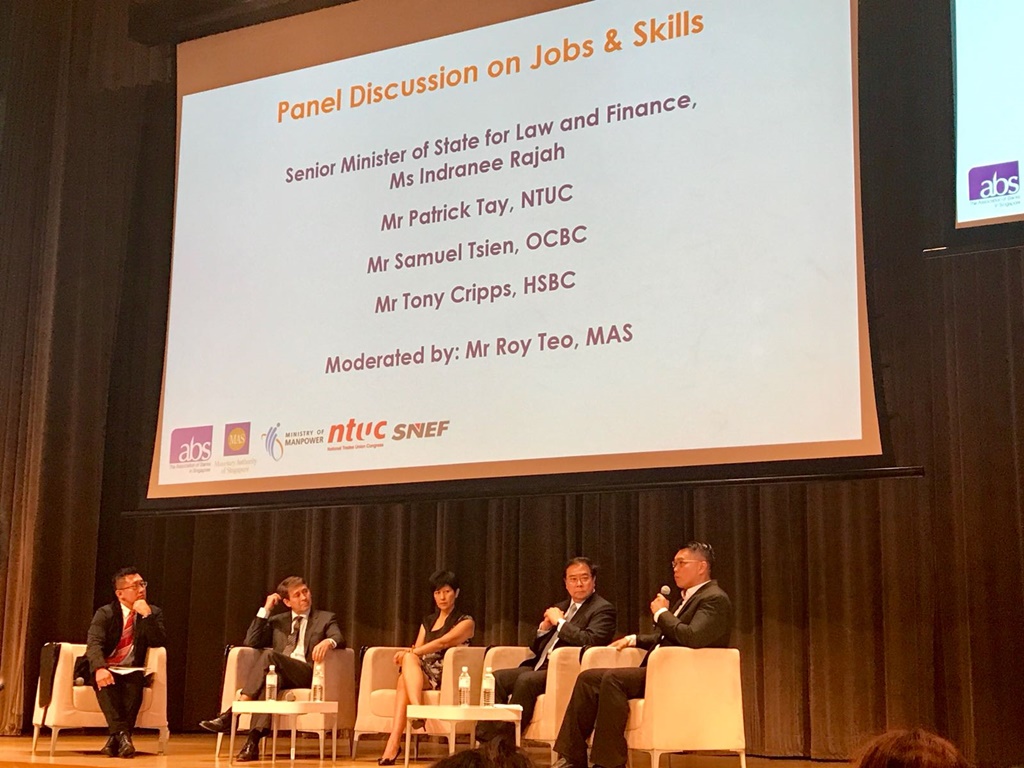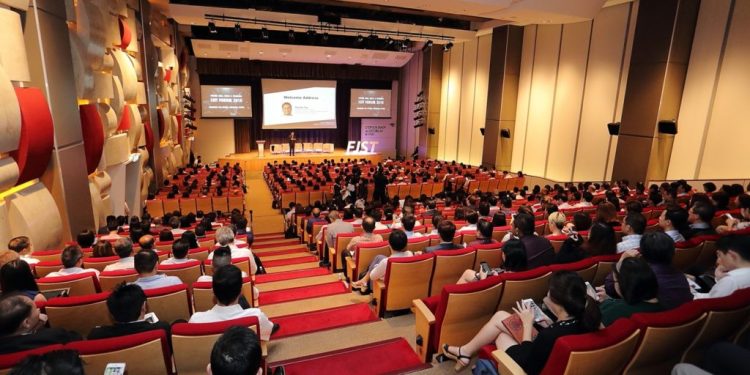This is a post by NTUC Assistant Secretary-General Patrick Tay. Any extracts should be attributed back to the author. 5 April 2018.
Since the inaugural Future Jobs, Skills and Training (FJST) Forum 2018 on 11 January 2018, it has been all hands on deck at the Labour Movement as we forge ahead with the push for transformation on various fronts.
The FJST Forum, organised by NTUC’s Future Jobs, Skills and Training capability (FJST), kicked off 2018 with insights on future trends on jobs, skills and training through sharing by thought leaders and industry experts from the Labour Movement, the Government, enterprises and consultancy firms to vision the future and inspire action.
For me, the key takeaways from the FJST Forum centered on “Action” (you can read the full report at this link http://bit.ly/FJSTForum2018Report):
- Companies need to transform to stay relevant. Technology and their workforce’s skillsets are enablers of success and employers need to take charge and adjust their organisation’s skillsets to enable business transformation.
- Workers need to keep abreast with business developments and technological advancements so that change does not take them by surprise. Getting connected with networks allows workers to access the best ideas, training and opportunities to stay competent to take on the jobs of tomorrow.
- Collective action on the part of all stakeholders is a key driver to enable deep, sustained and meaningful change.
These takeaways have been an influencing factor in the Labour Movement’s work.
Taking Care of Our Workers as Industries Transform
While companies push forward with transformation efforts, it has been at the top of mind of the Labour Movement to amplify our efforts to advocate for enhanced protection of our workers’ employment rights in these times of change.
I am heartened that the Labour Movement’s call for expansion of the Employment Act has been heeded by the Ministry of Manpower (MOM) at the recent Committee of Supply debate. With the removal of the salary cap of the Employment Act, the core benefits of the Act will now be extended to all employees. Adjustments will also be made to extend protection on hours of work and overtime pay to more workers. My fellow Labour Members of Parliament have also called for policy enhancements to safeguard our workers’ interests and ensure that no one is left behind.
With increased volatility and streamlining of businesses, I have also been particularly concerned about the need to have greater clarity of the ambit of Section 18A of the Employment Act which allows employers to transfer employees in a transfer of business undertaking. MOM has concurred that greater clarity is needed, and the tripartite partners, MOM, Singapore National Employers Federation (SNEF) and NTUC will be embarking on the formulation of guidelines to provide greater clarity on the scope of application of Section 18A of the Act.
Encouraging Employers to Systematically Equip Existing Workforce for the Future
At the FJST Forum, speakers also alluded to an increase in the phenomenon of employers looking to hire talent to “plug and play” (applicants who are ready for the position without any requisite training). I am concerned that employers are overlooking the value of developing talent in their organisation’s existing workforce.

I am glad to share that headway is being made in the Financial Services sector to encourage employers to systematically equip their existing workforce with relevant skills and capabilities for the future and encourage professionals to continuously upgrade their skillsets and competencies. The Tripartite Advisory on Human Capital Practices for Banking[1] was developed by The Association of Banks in Singapore, Monetary Authority of Singapore, MOM, SNEF and NTUC and it sets out good practices for banks in hiring, reskilling, redeployment and retrenchment. Nearly 160 banks[2] have committed to adopting the Tripartite Advisory. This is a prime example of how collective efforts and commitment by stakeholders can bring about deep, sustained and meaningful change and I look forward to more industries following suit.
To encourage and enable capability transfer from foreign expertise to the local workforce, I have also asked MOM to consider making exceptions to the funding cap of $300,000 under the Capability Transfer Programme. MOM has agreed that in exceptional cases where the cost of capability transfer is high, and local expertise is much needed but lacking, funding support of up to 90% and project cost of more than $300,000 will be assessed on a case by case basis.
In furtherance to the speakers’ recommendations at the Forum for employers to take charge of training and equipping their organisation’s workforce for the future, I have also called for the formulation of a tripartite capability development toolkit for employers to address capability gaps within their organisation and put best practices in place to achieve Human Capital Partnership outcomes.
Supporting Our Workers’ Career Progression
To strengthen support for workers in securing their next job, I have lobbied for enhancements of the national Jobs Bank and Adapt & Grow programmes to better address missed matches and mismatches. Responding to this call, MOM will be transforming Jobs Bank into a new platform called MyCareersFuture in 2Q 2018 to reduce missed matches and close skills or wage mismatches by leveraging on technology to provide intelligent job matching. Adapt & Grow programmes will also be enhanced to provide workers with more opportunities to try out jobs with increased training allowance and enhanced salary support.

In tandem with work at the policy front, the Labour Movement has also been working on sharing information on jobs and skills trends with workers, engaging workers to review their skills portfolios for relevancy, encouraging workers to upgrade themselves and to join learning networks such as NTUC’s U Future Leaders Exchange and NTUC’s e2i’s U Leap, so that they are equipped with the necessary skillsets ahead of time to take on the jobs of tomorrow. Going forward, the Labour Movement will continue to amplify mobilisation efforts to encourage workers to take up training and progression initiatives.
FJST will also continue to deepen its sector-specific analysis efforts through partnership initiatives with the different limbs in the Labour Movement, government agencies, private sector and Institutes of Higher Learning in six critical growth sectors – Financial Services, Infocomm & Technology, Healthcare, Manufacturing (Engineering), Wholesale Trade and Professional Services. Together with Labour Movement partners, FJST will undertake a targeted approach to more keenly identify jobs at risk of displacement and identify measures to upskill and place affected workers in in-demand jobs.
Co-Creating the Future Together
In 2018, the Labour Movement will be focused on efforts to “operationalise” the Industry Transformation Maps (ITMs) and many have asked me what “operationalising” the ITMs means. To me, it means the co-creation of Singapore’s future economy with all stakeholders. The ITMs are but blueprints. Action is required to translate vision into reality.
As we advance further with our efforts to push for transformation, I hope that we can co-create our desired future together with our “Feet on the Ground, Hand on Heart and Eyes to the Future”.
“Feet on the Ground” because we must ground ourselves on solid footing and fundamentals. We ensure our businesses and enterprises do well so that our workers benefit through better jobs and pay and stay employed and employable.
“Hand on Heart” because we must have courage to confront difficult challenges arising from transformation, share the fruits of our labour and ensure that no one is left behind.
“Eyes to the Future” because we have to have the clarity of focus to build our future together, the curiosity to test new innovations and the conviction to stay the course and prepare for the future.
Together, we accomplish more than we can alone. I welcome your feedback and your ideas and suggestions on all matters concerning future jobs, skills and training and how we can work together in preparing Singapore’s workforce to be future-ready, please contact the FJST team by email at FJST@ntuc.org.sg
[1] https://abs.org.sg/docs/library/tripartite-advisorybe07a69f299c69658b7dff00006ed795.pdf
[2] https://www.channelnewsasia.com/news/singapore/advisory-to-strengthen-human-resource-practices-in-banks-10042172

